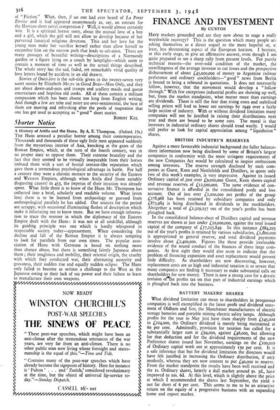Shorter Notice
A History of Attila and the Huns. By A. E. Thompson. (Oxford. 15s.) THE Huns aroused a peculiar horror among their contemporaries. Thousands and thousands of these ugly little men appeared suddenly from the mysterious interior of Asia, knocking at the gates of the Roman Empire, which, at the turn of the fourth century, was in no proper state to oppose them. Their extreme brutality and the fact that they seemed to be virtually inseparable from their horses imbued them with a sort of bestial centaur-like reputation which gave them a tremendous psychological advantage in battle. For half a century they were a chronic menace to the security of the Eastern and Western Empires, although when Attila died (from suitably disgusting causes) in 453, the impetus of their invasion was already spent. What little there is to know of the Huns Mr. Thompson has collected into a brief, scholarly and readable volume. What (even less) there is to be learned from archaeology or guessed from anthropological parallels he has added. Our sources for the period are scrappy, with occasional illuminating flashes of description which make it infuriating not to know more. But we have enough informa- tion to trace the manner in which the diplomacy of the Eastern Empire dealt with the Huns : it was not at all unskilful, although its guiding principle was one which is hardly whispered in respectable society today—appeasement. When considering the decline and fall of the Roman Empire it is always tempting to look for parallels from our own times. The popular asso- ciation of Huns with Germans is based on nothing more than chance abuse, but there is something faintly Japanese about them ; their toughness and mobility, their oriental origin, the cruelty with which they conducted war, their alternating austerity and grossness, their sudden rise and equally sudden eclipse. The Huns only failed to become as serious a challenge to the West as the Japanese owing to their lack of sea power and their failure to learn to manufacture their own weapons.


































 Previous page
Previous page